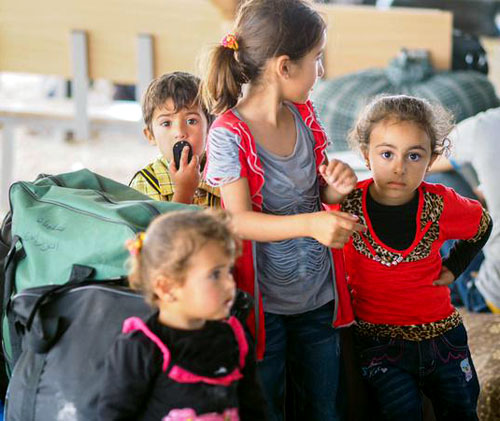AMMAN — Child labour is becoming “increasingly common” in Jordan, especially among refugees whose children join the labour market to help their families augment their income, according to a local advocacy group.
“This factor, together with lack of access to education, the cultural permissibility of child labour in certain contexts, and the demand for child labour from unscrupulous employers, is leading to a growth in the phenomenon in Jordan,” said an assessment study conducted by Tamkeen for Legal Aid and Human Rights, a non-governmental legal-aid centre that works for the protection and promotion of human rights.
The study, titled “Syrian Refugee Child Labour in Jordan and the Risk of Exploitation”, identifies a number of factors that drive the practice of child labour, the consequences of labour for the child and for the job market, and the responses to child labour from the government and NGOs.
Linda Kalash, executive director of the centre, said abject poverty and lack of social security and financial resources drive many Syrian children to join the labour market, amidst a “willingness” from Jordanian employers to recruit them for low salaries.
“Before conducting this prospective study, we expected a large number of children to be victims of human trafficking. After our field visits, it appears that many of these children are instead victims of exploitation and of their families’ economic difficulties,” she told The Jordan Times on Thursday.
The survey, which covered Amman and Irbid, and will be followed by “more thorough studies”, said the majority of Syrian children working in Jordan do not get “fair” wages, receiving less than the minimum wage specified for Jordanians — JD190 — and guest workers — JD150.
“There needs to be more of a focus on refugees outside the camps who struggle to make ends meet and are unable to access assistance,” said Kalash.
According to the study, around 46 per cent of Syrian boys in the workplace work more than 44 hours a week, while girls make up 14 per cent of the total number of Syrian children in the labour market.
Its findings are echoed by Save the Children Jordan, UNHCR and the Labour Ministry, which has stated on several occasions that child labour is a growing phenomenon in the nation, especially in light of the Syrian refugee crisis.
Many children are additionally involved in unsuitable and sometimes dangerous work environments, such as the construction sector which employs 6 per cent of the Kingdom’s working children, said the legal centre’s study.
At the same time some children, especially girls, are suspected to be victims of human trafficking and sexual exploitation.
“Although these make up only a few cases, they should be investigated and addressed,” said Kalash.
Last week, Labour Ministry Secretary General Hamadah Abu Nijmeh stressed the importance of increasing coordination among the members of the country’s National Committee to Combat Child Labour, saying that the committee should convene at least four times a year to ensure adequate coordination and boost national efforts to eliminate the problem.
The Tamkeen study recommended stiffer penalties against employers found in violation of the law on child labour, and further investing in the Labour Ministry’s child labour unit.
According to the International Labour Organisation, the Kingdom in 2011 adopted a National Framework to Combat Child Labour to improve the nation’s legislative environment.
This framework lays out the various roles and responsibilities of ministries to identify child labourers, remove them from work, and provide them with appropriate education and social services.
Jordan also ratified the UN Convention on the Rights of the Child in 1991, which obligates governments to protect children from work that is not conducive to their development or that intervenes with their fundamental rights, such as the right to education.
Articles 73, 74, 75 and 76 of the Labour Law ban the employment of children under the age of 16 and set limits on the employment of minors between the ages of 16 and 18.
Of the 629,627 Syrian refugees registered with the UNHCR in Jordan, the majority are women and children.
